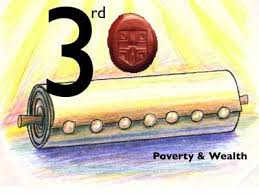A WOMAN STRONG IN HER FAITH
Mark 5:25–34
Matthew 9:20–22
Luke 8:43–48
The woman believed one thing; if she touched
Jesus she would be whole. The woman's faith was only appropriating what Jesus was
willingly to give. Faith is not something that you do but something that we
believe Jesus will do.
Here we had a woman that has been subject to bleeding
for twelve years. She had endured a great deal under the care of many doctors
and had spent all she had, yet instead of getting better she grew worse. Oh, but when
she heard about Jesus, she determinely made her way through the huge crowd and touched the hem of his cloak. She believed in her heart, “If I just touch his clothes, I will be healed.” And, immediately her bleeding stopped and she felt in her body that she was freed
from her suffering.
At once Jesus realized that power had gone out from
him. He turned around in the crowd and asked, “Who touched my clothes?” “You
see the people crowding against you,” his disciples answered, “and yet you can
ask, ‘Who touched me?’ ” But Jesus kept looking around to see who had done
it.Then the woman, knowing what had happened to her, came and fell at his feet
and, trembling with fear, told him the whole truth. He said to her, “Daughter,
your faith has healed you. Go in peace and be freed from your suffering.”
The woman's condition, which is not clear in terms of
a modern medical diagnosis, is translated as an "issue of blood"
in the King James Version and a "flux of blood" in the
Wycliffe Bible and some other versions. In scholarly language, she is often referred
to by the original New Testament Greek term as the haemorrhoissa (ἡ αἱμοῤῥοοῦσα,
"bleeding woman").
Because of the continual bleeding, the woman would
have been continually regarded in Jewish law as a niddah or menstruating
woman, and so ceremonially unclean. In
order to be regarded as clean, the flow of blood would need to stop for at
least 7 days. Because of the constant bleeding, this woman lived in a continual
state of uncleanness which would have brought upon her social and religious
isolation.
The Healing Of Spirit, Soul, and Body. DIVINE HEALING.
This
passage relates the account of a desperate woman whose healing was the result
of great and persistent faith. Her illness made her ceremonially unclean and
disqualified her for mixing with crowds of people, yet she was certain that
"if I may touch but his clothes, I
shall be whole".
The Greek word sozo ("heal, save, make well or whole") appears in this chapter,
offering Luke’s unique perspective as a physician. A full range of encounters appears,
manifesting Jesus’ healing power.
1. The Gadarene,
delivered from the demonic powers dominating him, is "healed," freed of evil powers that countermanded his own
rational mind and physical actions.
2. The woman with the
issue of blood touches the hem of Jesus’ garment and Jesus says, "Thy faith hath made thee whole.”
3. In v.50, after being
told the little girl is dead, Jesus declares: "Believe only, and she shall be made whole."
4. In v.12, as Jesus
explains the parable of the Sower, the word "saved" is used of one’s
restored relationship with God through faith. Luke’s precise account offers a
complete picture of the Savior’s concern to restore every part of man’s life:
a) our relationship
with God the Father
b) our broken
personalities and bondages
c) our physical health
and…
d) ultimately our
rescue from death itself at the Resurrection. Jesus Christ is the Savior of the
whole man.
8:44 The woman touched the hem of Jesus’ garment, the
tassels hanging from the edge of a Jewish cloak to remind the Jews of the Torah
(see Num. 15:38).
8:47 The woman’s faith,
which included not only her confidence in Christ’s restorative power, but her
importunate initiative as an unclean woman (Lev. 15:19), occasions her healing.
8:48 Jesus did not rebuke
her, but delayed His mission to the home of Jarius, whose daughter was dying,
in order to assure her of healing and salvation.
In Christ,
Janet
Irene Thomas
Director/Writer/Producer/Lyricist
Founder/CEO
Bible
Stories Theatre of
Fine
& Performing Arts

















